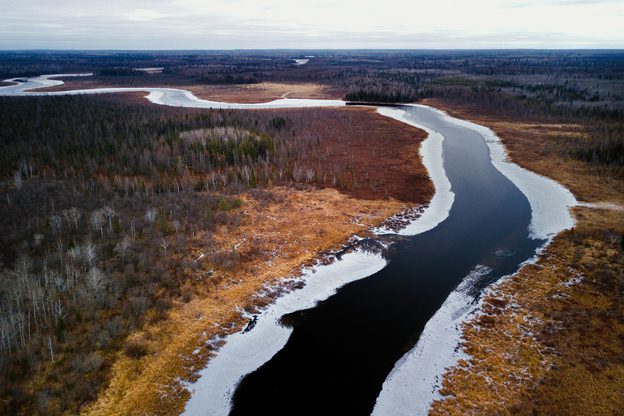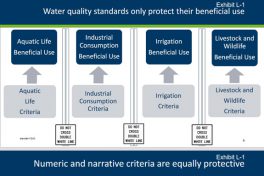

Lost in translation – Part Two
I listened in on most of the Office of Administrative Hearings February 4th WebEx hearing on the proposed MPCA rules. (I wrote about these proposed rules earlier.) It started out with a presentation by an engineer (not a life scientist or biochemist as far as I could tell) from the Minnesota Pollution Control Agency. He explained how the various water classes in Minnesota were like lanes on a freeway, and that there were double white lines between them that you couldn’t cross. I guess nobody ever explained this to water.
So class 3 is class 3, and class 4 is 4, and class 2 is the left turn lane.

MPCA slide for February 4th hearing at the OAH
If there had been a room to look around in, I am sure there would have been a lot of skeptical and frowning faces.
There were subsequent – wonderful – commenters: chemists, former regulators, representatives of the Ojibwe bands, and others, who said, Nah, water doesn’t work this way. Water has a mind of its own, they said, and just because you allow the dumping of pollutants like salts into class 3 or 4 water doesn’t mean it won’t wind up somewhere else. This bends some MPCA minds, I suppose, but it’s true.
I don’t think the slide is an accurate representation of water discharge regulation, either, because as noted in the linked story, a water body can exist in multiple classes; it usually does.
Parenthetically, I get hectoring messages from the Minnehaha Creek Watershed District or the city from time to time telling me how a teaspoon or so of salt can ruin five gallons of fresh water forever. I often read these messages while I observe the salt truck seasoning the streets where I live, a block uphill from Minnehaha Creek.
I believe the MCWD, though, so our letter carrier – a nice fellow, really – may die of a broken neck while delivering the latest Fingerhut flyer to our house. (Not really; we try to get the snow off before it’s compressed into ice.)
Where was I? Ah, yes.
Surface water becomes ground water, and ground water becomes surface water; both happen within blocks of my house, just as an example. This is a ballet that occurs everywhere, whether our regulators ignore it, or deny it, or not. Water doesn’t obey the lanes, and it surely doesn’t obey the regulators. Water is untidy that way.
The MPCA may say, Thou art Class 3 or Class 4 water, but water is hell bent on proving it’s something else, or it will go somewhere where it is something else.
Water discharge rules that don’t seem to worry about point source discharges of pollution and only concern themselves with the effects on a party perhaps far downstream and fail to consider the consequences to the flora and fauna and users in between – I can’t even find words to describe how odious that is. They probably wouldn’t be printable, anyway.
In the time that I listened to the hearing, the proposed rules had their champions, though. There was a trio of water quality ingenues who spoke on behalf of their municipal wastewater operator employers, who said that the proposed rules gave the MPCA needed “flexibility.” That was echoed by a couple of lawyer lobbyists.
I found these comments hair raising.
Please believe me, my friends, when I say that you don’t want to give our industry-captured MPCA “flexibility.” It’s inconsistent with the idea of “rules” that an agency “applies,” at all events. The whole purpose of rulemaking and public hearings is to fix the instructions for the agencies, not grant them a broad license, which the proposed rules would do.
What the MPCA gains in flexibility, it loses in accountability: to the tribes, the environmental nonprofits, and the public.
– o O o –
After the hearing, I submitted two comments to Judge Lipman in the Office of Administrative hearings. In the first one, I discussed what I see as two major shortcomings of the rules. First, although the MPCA says that the existing rules are “old science,” the proposed ones abandon science. Second, any pollution evaluation that does occur is remote from the point of discharge, ignoring the effects on the waterbody between the point of discharge and the remote place of evaluation.
In my second comment, I focused on the propensity of polluters to plead poverty in compliance with clean water rules and urged Judge Lipman to be careful to distinguish between “we don’t want to” and “we can’t” in evaluating complaints by municipal wastewater operators.
The economic hardship or impairment of economic development arguments were made by several municipal operators, in virtually identical letters that were obviously written by the same person or firm, almost certainly counsel for an association of rural cities.
The Willmar letter linked in the second comment can’t be viewed unless you are logged on to the OAH’s comment website. But you can see it here.
Thanks for your feedback. If we like what you have to say, it may appear in a future post of reader reactions.

